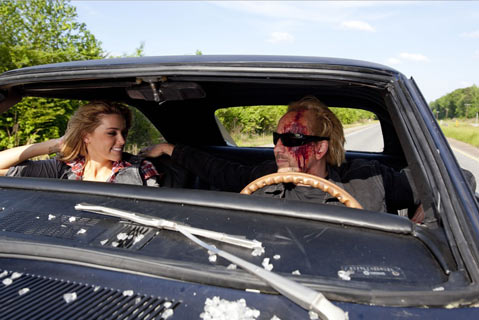Drive Angry
Nicolas Cage, Amber Heard, and William Fichtner star in a film written by Todd Farmer and directed by Robert Lussier.

Whether you call them grindhouse, drive-in, or good old-fashioned exploitation movies, even jaded connoisseurs must admit that the last six months have provided some horn-honking delights. Summer brought both the witty Piranha 3D and Robert Rodriguez’s surprisingly lucid comeback Machete. And now this id-driven thriller combines the aesthetic pleasures of a heavy-metal video with the trappings of 1960s Roger Corman road pictures like The Wild Angels, continuing the great tatty American tradition of B-minus filmmaking. We’re talking gratuitous nudity and wholesale bloodletting, where sensation trumps thought and excess artifice is the point.
Drive Angry stars Nicolas Cage, long the reigning nabob of the genre. Cage’s great strength combines his pretty-boy eyes and tough-guy drawl with a refusal to act like he’s slumming, whether in David Lynch films or grim junkers like Ghost Rider. Here, he plays an escapee from Hell who rides in a Dodge Charger, enjoying earthly delights before wreaking vengeance on the Satanist cult that killed his daughter. Turns out Beelzebub doesn’t like those creeps either.
Though not for the squeamish, Drive Angry was clearly scripted by a college boy, featuring “good” characters named John Milton and Daniel Webster, and opening (car chase, bloody shoot-out, naturally) someplace called Laughter, Texas. A pivotal Tarantino-esque character named The Accountant tells us the Devil himself is an introspective guy and surprisingly well-read.
If anything, Drive Angry has too many art-film flourishes. Besides inventive 3-D lyricism, director Patrick Lussier (Scream) tries to puncture his own illusions by staging a nasty bedroom shoot-out joke involving a waitress and Cage, but then returns later to show us the traumatized waitress. Because we feel like laughing, it’s merely confusing when Lussier wags a hypocritical finger at us. Not that it’s wrong, but the sudden conscience attack feels false, like Michael Haneke’s Funny Games, the man who set us up crying shame. These movies themselves stand as hellishly good indictments of American pleasures. We can lecture ourselves in the morning.



